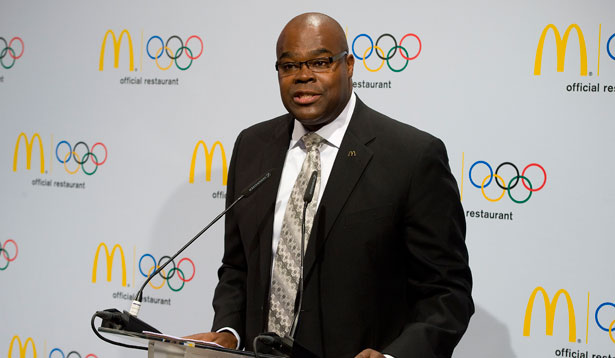
Don Thompson speaks at a press conference with the International Olympic Committee. (Kerstin Joensson/AP Images for McDonald's)
Following demonstrations outside McDonald’s headquarters and CEO Don Thompson’s home, striking guest workers will hold an international day of action on June 6. The fifteen strikers, all students who came to the United States on cultural exchange visas, plan to lay the groundwork in their home countries over the next two months.
The National Guestworker Alliance, the labor group spearheading the strike, said that McDonald’s had failed to address the wages the workers were still owed, their demands for reforms to avert abuse and their call for a meeting with Thompson. “He thinks if we go back to our country the problem is solved,” said striker Rodrigo Yañez. But “we’re going to keep the fight up in our countries, and we’re going to make it grow.”
“They didn’t count on the guest workers to supersize their campaign,” NGA Director Saket Soni said in an e-mail to The Nation. McDonald’s did not respond to a request for comment.
As The Nation first reported, the students walked off the job on March 6 over allegations including unpaid wages, repeated retaliation, substandard (employer-owned) housing and shifts of up to twenty-five consecutive hours. The J-1 visa program, under which the students came to the US from Asia and Latin America, is administered by the US State Department, which workers allege failed to aggressively address the abuse. Over the past four weeks, the workers have traveled from Central Pennsylvania to actions in Philadelphia, New York, Washington and Chicago. “We met with Americans that have been in the same situation we experienced,” said Yañez. “That’s been a cultural exchange for us.”
A McDonald’s spokesperson told The Nation on March 14 that the company was ending its relationship with Andy Cheung, the franchisee who had directly employed the striking workers, and that the company had “offered to have the most appropriate person in our management team meet with the student directly to address and resolve their concerns.”
In Washington, DC, workers visited congressional offices; striker Fernando Acosta told The Nation that they urged legislators to include the battery of immigrant worker protections known as the POWER Act in a comprehensive immigration reform deal. “We are sharing all of our stories,” said Acosta. “The same thing happened to other people.”
The McDonald’s strike has played out against the backdrop of immigration talks involving organized labor, business and key senators. In a Saturday statement, AFL-CIO President Richard Trumka announced “an agreement in principle” in the ongoing negotiations between the labor federation and the US Chamber of Commerce “to develop a new type of employer visa system.” According to the AFL-CIO, the proposed new “W visa” would come with stronger protections for workers, including: the chance to petition for permanent status after one year; not being tied to a specific employer; a Department of Labor complaint process; and a prohibition on employers shifting program fees to employees.
McDonald’s strikers will begin returning to their home countries this week. Workers said that the shape and scope of the June 6 day of action have not yet been determined. It won’t be NGA’s first foray into cross-border organizing; as I report in this month’s Dissent, the organization has also partnered with the Mexico-based human rights group ProDESC to organize Mexican guest workers in their hometowns before and after their annual trips to work in the United States.
“McDonald’s could make all this go away,” said Soni. “They could take responsibility for what happened to these guest workers inside their stores. They could adopt labor standards as they’ve promised. Or they could look forward to a long hot summer…”
Undocumented immigrants are coming out about their status—sometimes without the support of important allies. Read Aura Bogado's report.


